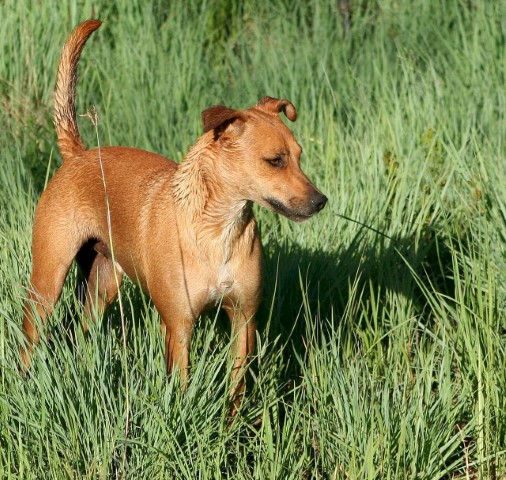 |
| Photo Source: Wikipedia.org |
Africanis
Dogs are a landrace aboriginal breed descending from South African dogs, and are
directly related to the hounds and pariah dogs of ancient Africa dating back
more than 7,000 years. They may have traveled with the Neolithic herdsman of
the Middle East to Africa. They are not a specifically selected or bred breed,
but are the result of natural selection and an adaptation to African ecological
conditions or “survival of the fittest.”
The
Africanis name is a categorical or umbrella name for all aboriginal dogs found
in South Africa. Specifically the name Africanis is broken down into “Africa”
(the continent) and “Canis” (dog).
Typically
they have a short, hard, thick coat and a medium-sized body type, with a
well-muscled build. They can be of any color and occasionally come with a
ridgeback. There is also a wire-haired variety of the breed, but it is
relatively rare. They are 50 to 60 cm high and are very social dogs, with
friendly, but sometimes territorial behaviors.
They
can be a good family dog and excels at physical activity. They can run at great
speeds, making them a great do to exercise with. They have clear body language
and many facial expressions but a bit of a nervous constitution, which comes
from centuries of natural survival instincts.
Africanis
Dogs are also generally a very healthy dog. They do not need to be groomed or
fed specific food. Because of their adaptation over centuries have developed a
natural resistance against internal and external parasites.
Other
names commonly used for the Africanis are: African Dog, Bantu Dog, Hottentot
Hunting Dog, Khoikhoi Dog, Zulu Dog and the Swahili name Umbwa Wa Ki-Shenzi
meaning common, mongrel, or traditional dog.
There
are varying opinions on the Africanis as a standardized dog breed vs. a
category of dogs as an aboriginal landrace dog. There has been much controversy
over this classification.
The
Africanis is recognized by the Kennel Union of Southern Africa and the
AfriCanis Society of Southern Africa.
